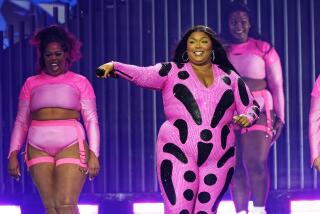Business: beastly toward beauty?
- Share via
In an odd twist of timing, a new book about workplace discrimination against the “unattractive” has coincided with a lawsuit by a woman who claims she was fired because she was too attractive. Deborah L. Rhode, a Stanford law professor and the author of “The Beauty Bias,” thinks that “looksism” is such a pervasive problem that the only recourse is to impose laws similar to those designed to combat discrimination based on race and gender. This would mean (to cite two real-life examples of alleged beauty bias) Hooters waitresses couldn’t be fired for gaining weight and managers at Abercrombie & Fitch couldn’t monitor their sales staff for acne breakouts.
Moreover, Rhode argues, such laws would serve as a corrective to what she sees as commonplace attractiveness prejudice. In the United States, Rhode writes, the unattractive are more likely to be given higher prison sentences and lower salaries and performance assessments. They’re more likely to be poor and less likely to be married. In one survey, college students said that having an obese spouse would be worse than having one who was an embezzler, drug user or shoplifter.
Anyone who went to high school probably sees some sense in this analysis. But then, what are we to make of Deborahlee Lorenzana? She’s the 31-year-old former employee of a Midtown Manhattan Citibank branch who’s suing the company for firing her for, she says, being too sexy. She says she was called out for wearing high heels, form-fitting business suits, pencil skirts and turtlenecks.
“As a result of her tall stature, coupled with her curvaceous figure,” says Lorenzana’s lawsuit, she was told “she should not wear classic high-heeled business shoes, as this purportedly drew attention to her body in a manner that was upsetting to her easily distracted male managers.”
Given the number of well-endowed lovelies circulating in Midtown Manhattan, it seems unlikely that Lorenzana’s beauty was so exceptional that anyone in her presence was rendered unable to perform a banking job. And to watch her make the media rounds over the last few weeks is to wonder if there is more to the story. Had Lorenzana, in fact, dressed more provocatively than she and her lawyer claim? Is it possible she was fired for doing a bad job? Moreover, even if her attire was appropriate, could she have somehow made her co-workers uncomfortable for other reasons?
Despite a flurry of opinion on the subject, no one (except Lorenzana and her co-workers) can know what went on in that bank. And it’s equally hard to know exactly what to make of reports that Lorenzana’s current employer has threatened to fire her for the media storm she’s created. Then there’s the fact that for every photo Lorenzana’s lawyer has released showing her looking like a page from the Talbots catalog, there seem to be just as many floating around that look like model portfolio shots with an emphasis on certain surgical enhancements.
But here’s my best guess about Lorenzana: If there’s anything more distracting and potentially bothersome than someone with extraordinary looks, it’s someone who’s obsessed with those looks. Lorenzana demurred somewhat in the wake of her suit — “The reality, I’m a size 32DD. I’m very skinny, and then I have curves” — but it’s pretty clear that she’s actively pursued exactly that profile. The N.Y. Daily News dug up footage from a 2003 reality show wherein Lorenzana, eagerly anticipating her second breast enhancement (and fourth plastic surgery altogether), explains her goal: looking like a Playboy playmate. Not that any of this justified harassment or rendered her unemployable.
That’s because as unforgiving as Rhode’s version of beauty bias can be, Lorenzana’s might represent an even worse tyranny, one that sees beauty as something that must be chased down like prey and then flaunted. It’s a beauty that is never owned outright but instead leased and under constant threat of repossession, a beauty that’s only as good as the latest spray-on tan and the last teeth-whitening session. In other words, it’s the same brand of beauty that gets shoved down our throats every time we read about celebrities or watch a makeover show on TV, the kind that tells us that being hot is not only crucial but also a full-time job.
And, as Lorenzana discovered, holding down two full-time jobs can be an ugly business.
More to Read
Inside the business of entertainment
The Wide Shot brings you news, analysis and insights on everything from streaming wars to production — and what it all means for the future.
You may occasionally receive promotional content from the Los Angeles Times.










